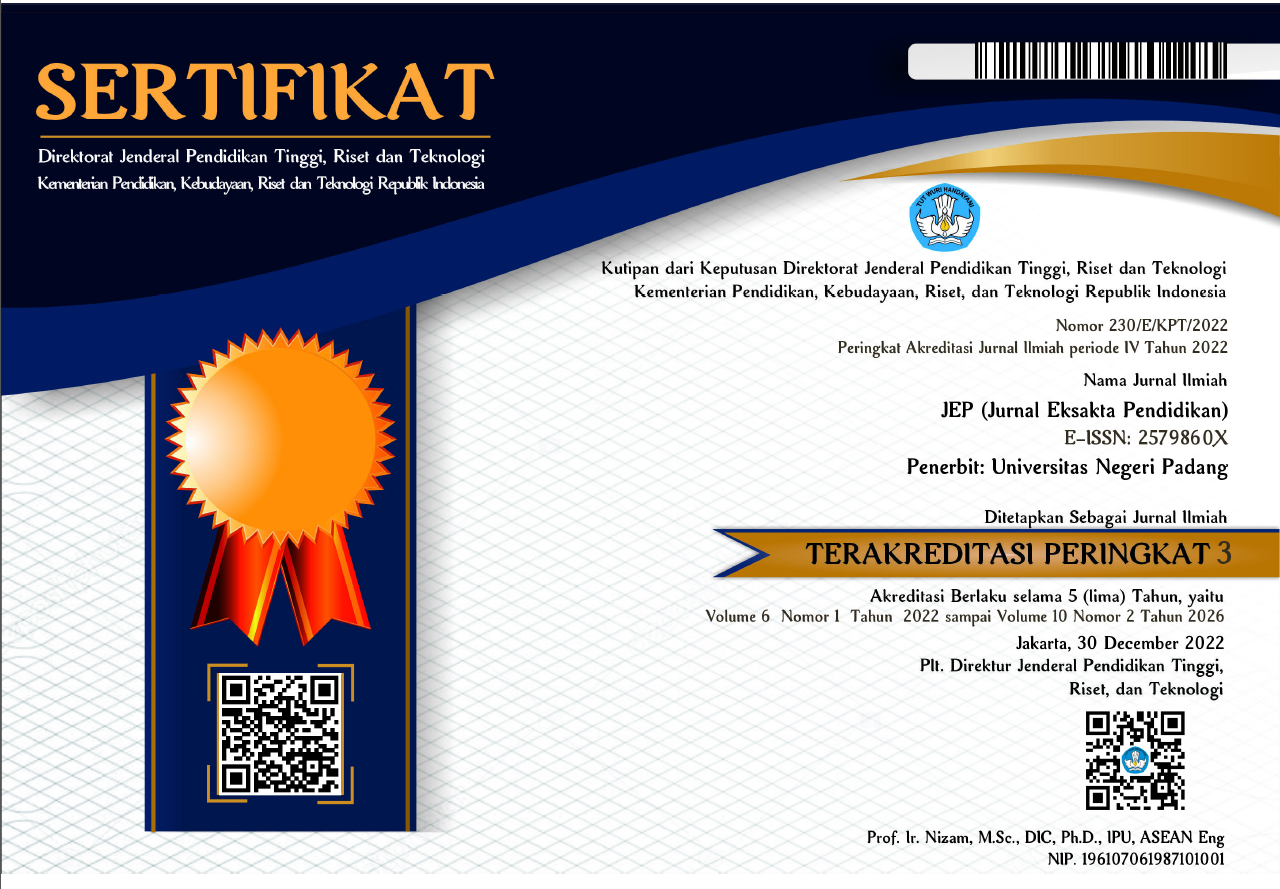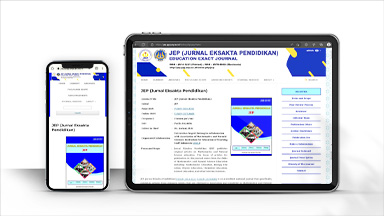A Comparison of Science Education between Germany, China and Indonesia
Abstract
The development of a science-based society is strongly influenced by science education. The comparison of science education between Germany, China and Indonesia is an interesting topic because they have different traditions and approaches to developing their science education systems. This research aims to study the differences in science education in Germany, China and Indonesia. This research will compare science education between the three countries through several aspects, such as curriculum, teaching methods, teacher training, educational infrastructure, challenges and opportunities, and philosophical basis. The secondary data used in this research is obtained from reliable sources. The results show that the science education system in Germany is highly organised and focuses on an in-depth understanding of concepts. In contrast, science education in China is highly competitive, and academic achievement is prioritised. Science education in Indonesia tries to combine concept understanding and practical skills. However, implementation and assessment still need to be improved. Thus, a comparison of science education in Germany, China and Indonesia shows differences in curriculum, teaching methods, teacher training, educational infrastructure, opportunity challenges and philosophical basis. Each country has advantages and disadvantages. By thoroughly understanding science education in these countries, we can find many lessons that can be used to improve the science education system. Collaborative efforts and exchange of experiences between these countries will help improve science education.
Downloads
References
Argina, A. W., Mitra, D., Ijabah, N., & Setiawan, R. (2017). Indonesian PISA Result: What Factors and What Should Be Fixed? Proceedings Education and Language International Conference, 1(1), 69–79. https://jurnal.unissula.ac.id/index.php/ELIC/article/view/1212
As’ad, M. (2014). Filosofi Pendidikan Cina dan Korelasinya Terhadap Konsep Pendidikan Islam [Chinese Philosophy of Education and Its Correlation to the Concept of Islamic Education]. Al-I’lam Jurnal Pendidikan dan Dakwah, 26–32. https://www.scribd.com/doc/275235026/FILOSOFI-PENDIDIKAN-CINA-DAN-KORELASINYA-TERHADAP-KONSEP-PENDIDIKAN-ISLAM
Cahyati, D., Hariri, H., & Hermanto Karwan, D. (2021). Women’s Leadership in Higher Education: Barriers and Opportunities in Indonesia. International Journal of Education Policy & Leadership, 17(9). http://journals.sfu.ca/ijepl/index.php/ijepl/article/view/939
Chen, W. (2022). Transportation Infrastructure and Family Educational Expectations: An Empirical Analysis Based on the China Family Panel Survey. Best Evidence in Chinese Education, 12(2), 1643–1651. https://doi.org/10.15354/bece.22.ab017
Chiappetta, E., & Koballa, T. (2010). Science Instruction in the Middle and Secondary Schools Developing Fundamental Knowledge and Skills. Pearson.
Chris, H. (2018). Doing a Literature Review. Sage Publications, Inc.
Dilber-Özer, Z., & Baysal, Z. N. (2022). Learning Places, Teaching Methods, Techniques and Materials Used in General Studies (Sachunterricht) Lesson by Teachers in German Primary Schools’ Third Grade. Education 3-13, 50(7), 934–953. https://doi.org/10.1080/03004279.2021.1926527
Doğan, M., & Saraç, M. (2022). Redefining Classroom Management in Hybrid Education Setting from the Perspectives of EFL and German Language Instructors. International Journal of Asian Education, 3(2), 87–96. https://doi.org/10.46966/ijae.v3i2.285
Dusen, B. Van, Vogelsang, C., Taylor, J., & Cauet, E. (2021). How to Teach a Teacher: Challenges and Opportunities in Physics Teacher Education in Germany and the USA. Challenges in Physics Education, 55–81. https://doi.org/10.1007/978-3-030-87391-2_3
Fahrudin, F., Ansari, A., & Ichsan, A. S. (2021). Pembelajaran Konvensional dan Kritis Kreatif dalam Perspektif Pendidikan Islam [Conventional and Critical Creative Learning in the Perspective of Islamic Education]. Hikmah, 18(1), 64–80. https://doi.org/10.53802/hikmah.v18i1.101
Fatimaningrum, A. S. (2012). Manajemen Kurikulum Pendidikan Dasar di China [Curriculum Management for Primary Education in China]. Seminar Nasional Diseminasi Shortcourse Bermutu Dikti, 1–10. https://staffnew.uny.ac.id/upload/132319973/penelitian/Manajemen+Kurikulum+Pend+Dasar+di+China_Arumi.pdf
Feng, D. (2006). China Recent Curriculum Reform: Progress and Problem. Planning and Changing, 37(1), 131–144. https://files.eric.ed.gov/fulltext/EJ756220.pdf
Haji, E., Kiyai, B., & Pombengi, J. D. (2011). Peran Pemerintah Daerah dalam Mewujudkan Pembangunan Infrastruktur Pendidikan (Suatu Studi di Sekolah Menengah Atas) [The Role of Local Government in Realizing Educational Infrastructure Development (A Study in Senior High Schools)]. Media Neliti. https://www.neliti.com/id/publications/1414/peran-pemerintah-daerah-dalam-mewujudkan-pembangunan-infrastruktur-pendidikan-su
Kemendikbudristek. (2023). PISA 2022 dan Pemulihan Pembelajaran di Indonesia [PISA 2022 and Learning Recovery in Indonesia].
Kurniawati. (2015). Pendidikan Sejarah dalam Kurikulum di Republik Federal Jerman: A Lesson Learned [History Education in the Curriculum in the Federal Republic of Germany: A Lesson Learned]. Jurnal Pendidikan Sejarah, 4(1), 1–13. https://journal.unj.ac.id/unj/index.php/jps/article/view/2959
Lee, R. M., & Yuan, Y. (Selena). (2018). Innovation Education in China: Preparing Attitudes, Approaches, and Intellectual Environments for Life in the Automation Economy. In Higher Education in the Era of the Fourth Industrial Revolution (hal. 93). https://doi.org/10.1007/978-981-13-0194-0
Li, J., Wiemann, K., Shi, W., Wang, Y., & Pilz, M. (2019). Vocational Education and Training in Chinese and German Companies in China: a ‘home international’ Comparison. International Journal of Training and Development, 23(2), 153–168. https://doi.org/10.1111/ijtd.12151
Liu, L. (2023). Opportunities and Challenges for Private Education in China: A Review of the Latest Policy Revisions. ECNU Review of Education, 6(1), 141–154. https://doi.org/10.1177/20965311221120829
Liu, N., & Neuhaus, B. J. (2017). A Cross-Cultural Comparison of Biology Lessons between China and Germany: a Video Study. Cultural Studies of Science Education, 13(3), 671–686. https://doi.org/10.1007/s11422-016-9797-6
Maryanti, R., & Nandiyanto, A. B. D. (2021). Curriculum Development in Science Education in Vocational School. ASEAN Journal of Science and Engineering Education, 1(3), 151–156. https://doi.org/10.17509/ajsee.v1i3.38429
Melfianora. (2019). Penulisan Karya Tulis Ilmiah dengan Studi Literatur [Writing Scientific Papers with Literature Studies]. Open Science Framework, 1–3.
OECD. (2023a). PISA 2022 Results China. Factsheets, I, 1–9. https://www.oecd-ilibrary.org/education/pisa-2022-results-volume-i_53f23881-en%0Ahttps://www.oecd.org/publication/pisa-2022-results/country-notes/germany-1a2cf137/
OECD. (2023b). PISA Germany 2022 Results. Factsheets, I, 1–9. https://www.oecd-ilibrary.org/education/pisa-2022-results-volume-i_53f23881-en%0Ahttps://www.oecd.org/publication/pisa-2022-results/country-notes/germany-1a2cf137/
Ohlssen, M., & Krempecki, L. (2020). Developing and Sustaining High Quality Special Education Infrastructures. National Center for Special Education in Charter Schools. https://www.proquest.com/reports/developing-sustaining-high-quality-special/docview/2488228334/se-2?accountid=13042%0Ahttp://oxfordsfx.hosted.exlibrisgroup.com/oxford?url_ver=Z39.88-2004&rft_val_fmt=info:ofi/fmt:kev:mtx:book&genre=report&sid=ProQ:ProQ%3Ae
Pingge, H. D. (2019). Pendidikan Guru di Jerman [Teacher Education in Germany]. Artikel Pendidikan Guru di Dunia, 7–20. https://www.academia.edu/42082553/PENDIDIKAN_GURU_DI_JERMAN_Dellu_Pingge_dikonversi
Prihantoro, C. R. (2015). The Perspective of Curriculum in Indonesia on Environmental Education. International Journal of Research Studies in Education, 4(1), 77–83. https://doi.org/10.5861/ijrse.2014.915
Pujiastuti, S. I., Schwarz, M., & Holodynski, M. (2021). Socialization Goals of Preschool Teachers for Moral Education: A Cross-Cultural Comparison between Urban Contexts of Germany and Indonesia. Early Child Development and Care, 191(3), 360–372. https://doi.org/10.1080/03004430.2019.1621307
Rohman, A. (2013). Pendidikan Komparatif, Dasar-Dasar Teori Perbandingan Pendidikan Antar Bangsa [Comparative Education, Theoretical Foundations of Comparative Education Among Nations]. Aswaja Pressindo.
Sari, D. S. (2017). Comparison of Education Concept in Indonesia with Germany: Analysis Of Science Learning System. Prosiding Seminar Nasional III Biologi dan Pembelajarannya, September, 769–778. https://digilib.unimed.ac.id/id/eprint/28458/1/SD Sari.pdf
Sariyatun, Joebagio, H., & Akhyar, M. (2018). Teachers’ Perception on Digital Teaching Material Development in Social Science Education. Journal of Turkish Science Education, 15(Special Issue), 13–21. https://doi.org/10.12973/tused.10252a
Sarwanto, Hinduan, A., Trisnamansyah, S., & Rusli. (2009). Pelatihan Keterampilan Proses Ilmiah Berbasis Organisasi Belajar Bagi Guru Sekolah Dasar [Learning Organization-Based Scientific Process Skills Training for Elementary School Teachers]. Paedagogia, 12(1), 10–21. https://doi.org/https://doi.org/10.20961/paedagogia.v12i1.35980
Setiani, I. (2021). Perkembangan Pendidikan dan Hubungannya dengan Pendidikan Guru Sains di Beberapa Negara [Educational Development and its Relationship to Science Teacher Education in Some Countries]. Skripsi, IAIN Ponorogo.
Shaw, N. (2004). Educational Reform and School Participation In the Federal Republic of Germany. UECA Conference Proceedings for Convention 2004, 26, 111–129. https://doi.org/10.5998/jces.2000.111
Sjöström, J., & Eilks, I. (2021). Correction to: The Bildung Theory—From von Humboldt to Klafki and Beyond. Springer International Publishing. https://doi.org/10.1007/978-3-030-43620-9_33
Sulthon, S. (2016). Pembelajaran IPA yang Efektif dan Menyenangkan bagi Siswa Madrasah Ibtidaiyah [Effective and Fun Science Learning for Madrasah Ibtidaiyah Students]. ELEMENTARY: Islamic Teacher Journal, 4(1). https://doi.org/10.21043/elementary.v4i1.1969
Syakhrani, A. W., Bahrianti, Dewi, Mahmudah, & Rahmadina, E. (2022). Sistem Pendidikan di Negara China [Education System in China]. Adiba: Journal of Education, 2(3), 413–420. https://adisampublisher.org/index.php/adiba/article/download/161/163
Tang, T., Aldhaeebi, M. A., Lan, J. Q., & Bamanger, E. (2020). Comparison of the Graduate Education between Canada and China. International Journal of Higher Education, 9(4), 13–26. https://doi.org/10.5430/ijhe.v9n4p13
Undang-Undang Republik Indonesia No. 20. (2003). Sistem Pendidikan Nasional [National Education System].
Yang, X., Schwarz, B., & Leung, I. K. C. (2021). Pre-service Mathematics Teachers’ Professional Modeling Competencies: A Comparative Study between Germany, Mainland China, and Hongkong. Educational Studies in Mathematics. https://doi.org/10.1007/s10649-021-10064-x%0APre-service
Yin, H. (2013). Implementing the National Curriculum Reform in China: A Review of the Decade. Frontiers of Education in China, 8(3), 331–359. https://doi.org/10.3868/s110-002-013-0023-3
Yufarika, S. D. (2023). Tantangan Dunia Pendidikan dan Implikasinya terhadap Perubahan Kebijakan [Education Challenges and their Implications for Policy Change]. Ar-Rosikhun: Jurnal Manajemen Pendidikan Islam, 2(2), 156–161. https://doi.org/10.18860/rosikhun.v2i2.21812
Zhang, L., & Diao, P. (2023). Teaching Quality Management of Physical Education Especialty in China and Ukraine. International Journal of Evaluation and Research in Education, 12(2), 1051–1058. https://doi.org/10.11591/ijere.v12i2.24090
Zulkardi, Z., & Kohar, A. W. (2018). Designing PISA-Like Mathematics Tasks in Indonesia: Experiences and Challenges. Journal of Physics: Conference Series, 947(1). https://doi.org/10.1088/1742-6596/947/1/012015
Copyright (c) 2024 Ardi Ardi, Azwar Ananda, Rusdinal Rusdinal, Nurhizrah Giastituati, Fauziah Hervi

This work is licensed under a Creative Commons Attribution 4.0 International License.

This work is licensed under a Creative Commons Attribution 4.0 International License.




_(2579-860X).png)
_(2614-1221)1.png)




